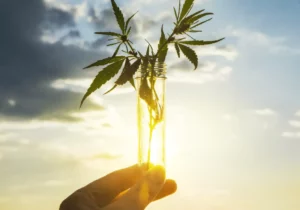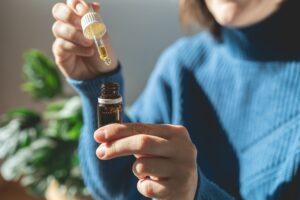"Which CBD tincture is best to eliminate inflammation associated with Chron’s disease?"
Our hemp CBD tinctures do not contain THC, so none of them will be psychoactive.
The most powerful CBD product for inflammation will be the one with the highest concentration of CBD. We are particularly fond of the Wildflower CBD+ tincture, with contains 1000mg of full-spectrum CBD extract: https://www.hellolift.com/products/5b57ae8402f1740001523015/cbd-relief
Kevin P.
The endocannabinoid system (ECS) is largely devoted to maintaining homeostasis (the tendency of organisms to auto-regulate and maintain their internal environment at equilibrium). Deficiency or malfunction of the ECS has become a focus for researchers seeking treatment options for several maladies—especially those that have few, if any, effective pharmocotherapeutic interventions, such as celiac disease, MS, fibromyalgia and IBD (Crohn’s disease and and ulcerative colitis). In fact, the scientific community has recently termed the ECS malfunction "Clinical Endocannabanoid Decifiency," or CECD. CBD works by balancing and supporting the ECS through its subtle effects on cannaboinoid receptor-1 (CB1) and cannaboinoid receptor-2 (CB2) receptors, as well as other receptors that modulate serotonin, GABA, dopamine, and many more.
drkim
In IBD and GERD, inflammation is central to both the etiology and symptomology of the respective disease. CBD is well known as an effective immunomodulator and anti-inflammatory, and those properties still do apply to GI inflammation. However, unique to the GI tract, are specialized nerve cells called enteric glial cells— "the glue of the nteric nervous system (ENS)"—which, when overactive, also contribute to acute and chronic GI inflammation. Recent pre-clinical research suggests that CBD may lower GI inflammation by controlling reactive gliosis in the ENS. Or, in other words, CBD restores homeostasis in the gut by reducing hyperactivity in enteric glial cells.
The enteric ENS is an extensive network of neurons supported by enteric glial cells (the above mentioned "glue" on the ENS). Two neural plexuses comprise the ENS: the myenteric plexus, involved in motility/peristalsis; and the submucosal plexus, involved in intestinal and gastric secretions. CBD works to restores homeostasis in the ENS via modulation of enteric glial cells (as mentioned above), the myenteric plexus, and the submucosal plexus.
drkim
Furthermore, several studies show that among patients who seek medical attention for IBS or IBD, around 70% of IBS patients, and 30% of IBD patients, have psychiatric comorbidity—depression and generalized anxiety disorder being most common. CBD increases serotonin signaling at the 5-HT1A receptor—the same neurotransmitter and receptor that SSRIs like Prozac influence—which is mostly why CBD has antidepressant and anxiolytic properties. In fact, SSRIs and tricyclic antidepressants (which also increase serotonin signalling), have been shown to alleviate anxiety and depression symptoms, as well as alleviate some of the abdominal pain and bowel symptoms involved in IBS, IBD and gastroesophageal reflux disease (GERD), which is why SSRIs and TCAs are commonly prescribed for IBS and IBD.
When choosing products, make sure that the product label specifies the amount of CBD and/or THC per drop or dropper-full (such as the product Kevin recommended). Many products simply state the total amount of CBD and/or THC, which leads to unnecessary confusion.
I hope this helps!
drkim





